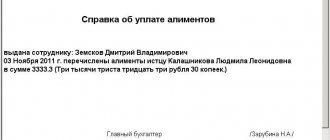Grounds for reducing or canceling debt
Content
Alimony obligations are established by agreement between the parties or in court. In the latter case, a writ of execution (IL) is issued, and when the case is considered in writ proceedings, a court order is issued.
In order not to pay a penalty of 0.1% of the amount, debtors try to reduce the amount of debt. Everything can be done if there are grounds provided for in Art. 114 RF IC.
The law states that the parties can reduce the debt by entering into a peace agreement. This is true when payments are intended to support former spouses or parents.
When paying money for the maintenance of a minor, the issue is resolved in court, including by agreement, when the recipient does not object to the reduction of the debt.
When it comes to reducing payments for children, this is possible for valid reasons for non-payment.
According to the Resolution of the Plenum of the Armed Forces of the Russian Federation dated December 26, 20167 No. 56, these include:
- Compulsory military service. When the payer is sent to serve, alimony obligations are not canceled. In such a situation, he can turn to the bailiffs to suspend proceedings for the period of service, and the debt will not accrue. Production resumes upon returning home. Otherwise, a debt is formed, which can be reduced or canceled through the court.
- Treatment in a medical hospital. In such cases, an application for suspension of proceedings is not filed, and debt begins to accumulate. It can be canceled by submitting the relevant certificates.
- Changes in the financial situation of the alimony payer, the emergence of new dependents. When a child is born in a new marriage, the financial situation may worsen, which creates obstacles to repaying the debt. According to the law, no more than 70% of the salary can be withheld in the form of alimony along with debt payments. When there is not enough money, the court, after consideration, has the right to reduce the amount of debt.
- Force majeure circumstances during the period of non-payment. If at this time there were military actions, fires, floods in the payer’s territory, the debt can be reduced.
Each situation is considered by the court individually. The court takes into account documentary evidence of valid reasons and the financial situation of the debtor. In the event of a combination of unfavorable factors, complete cancellation of the debt is possible.
Exemption from alimony payments
The payer, who finds himself in a difficult life situation, strives to get rid of both the debt and obligations in general. This applies not only to payments in favor of children, but also to assistance to the child’s mother raising a baby or disabled child; parents; relatives in need of help.
The grounds for termination of obligations are listed in Art. 120 IC RF:
- Upon expiration of the agreement on the basis of which collections were made, or in the event of the death of one of the parties to the agreement (payer, recipient).
- When the child reaches adulthood. In exceptional cases - upon emancipation - it is possible to terminate alimony from the age of 16 (Article 27 of the Civil Code of the Russian Federation, Article 21 of the Civil Code of the Russian Federation). Full legal capacity occurs upon entering into a legal marriage, when carrying out entrepreneurial activities or working under a contract or employment contract. If the payer proves that the child receives income that exceeds the parent’s earnings and is ready for full self-sufficiency, the court may cancel the child support debt.
- In the case of adoption of a child in whose favor alimony was withheld.
- If the recipient, who was assigned alimony due to incapacity and need, became capable or began to receive other types of income.
- When the former spouse receiving alimony enters into a new legal marriage.
- In the event of the death of one of the parties.
Only under these circumstances can you be completely freed from alimony. In other cases - if health deteriorates, other children appear, we can only talk about reducing the amount of payments.
Responsibility for non-payment of alimony and debt
In case of deliberate failure to pay alimony for a period of more than 2 months, the alimony obligee may be charged under Art. 5.35.1 Code of Administrative Offenses of the Russian Federation. Punishment is compulsory labor, administrative arrest for up to 15 days or a fine of up to 20,000 rubles.
When debt is re-formed, the provisions of Art. 157 of the Criminal Code of the Russian Federation, which provides for imprisonment for up to 1 year, correctional or forced labor.
In both cases, the decision is made by the court. The initiator can be a claimant or a bailiff.
During the proceedings, a FSSP employee may apply coercive measures:
- seizure of bank accounts;
- restriction of use of a driver's license;
- prohibition on performing registration actions with property;
- ban on traveling abroad;
- executive search.
If a large amount of debt is formed, the seizure of property is allowed by court decision. Other measures are applied for debts over 10,000 rubles. and are formalized by the relevant resolution of the FSSP.
Unilateral refusal
The legislation of the Russian Federation does not give the payer the right to unilaterally refuse the obligations assigned to him. You cannot stop paying child support if:
- I just don’t feel like it;
- it seems that the court imposed too large a sum of deductions;
- there are suspicions that the ex-wife, who manages the incoming funds, is spending them unlawfully;
- It is planned to save money for any personal needs.
In all of these cases, the judicial practice is the same. A negligent alimony payer will be obliged in court not only to resume deductions, but also to return to the recipient the debt accumulated during the “downtime”.
If a citizen refuses to comply with the court’s demands voluntarily, the bailiffs will get involved in the case - and sooner or later the debt will be collected.
Procedure for reducing the amount of debt
To reduce the amount of debt, the payer must do the following:
- File a statement of claim and go to court. The case is being considered within the framework of civil procedural legislation.
- Receive notification with the date of the first meeting. It is sent by the secretary to all parties to the paperwork. The defendant is the recipient of alimony, and a copy of the claim is sent to him.
- Come to the meeting. It examines the evidence presented and examines the parties' arguments. If the defendant does not object to the reduction of the debt, the case can be considered in one day.
- Receive a court decision after it comes into force. A writ of execution (IL) is attached to it.
- Submit the IL to the bailiff who initiated the proceedings. If this is not done, he will not be able to cancel the debt, and it will continue to accrue.
The payer can go to court at any time. Release from debt or reduction in its amount is carried out only by court decision.
Jurisdiction
The claim is filed in the magistrate's court at the place of registration of the plaintiff or defendant.
When a court decision does not suit one of the parties, it is possible:
- appeal before entry into legal force in the appellate procedure;
- decisions that have entered into force are appealed by filing a cassation appeal.
An appeal or cassation is filed with the court that made the contested decision. After a series of procedural steps, the complaint is automatically sent to a higher authority. The decision is canceled on the basis of an appeal or cassation ruling.
How to file a claim?
A claim to reduce the amount of debt consists of an address part, a title and a main part. A unified form is not established by law.
To fill it out correctly, you can use the following example:
To the Magistrate's Court of Belgorod, st. Michurina, 57
Plaintiff: Mamatov O. N.
Address: Belgorod, st. August 5, 39, apt. 65
Defendant: Afanasenko L.D.
Address: Belgorod, st. Pervomaiskaya, 11, apt. 37
Statement of claim
On the basis of writ of execution No. 347684, I am obliged to pay alimony in the amount of 1/4 of my monthly earnings for the maintenance of Mamatov’s minor son K.O.
At the time of collecting alimony, I had an official place of work, my salary was 20,000 rubles. 5,000 rubles were paid per child monthly. In addition to the above deductions, I regularly bought clothes and toys for my son, made gifts, and purchased food. I did not maintain a relationship with my ex-wife.
In May 2020, there was a reduction at the company where I was employed, and as a result I was fired. I tried to find a job, but I couldn't find a job. Considering my age - 50 years old - there were refusals from all the organizations I applied to.
Due to the lack of a place of work, I have accumulated a debt in the amount of 105,053 rubles. according to the decision of the bailiff Makarenko O.V.
In October 2020, I faced another difficult life situation: my house burned down. I was injured in a fire and was in the hospital for 3 weeks, then I was released for outpatient treatment. Now I live with my mother. Guided by the norms of Art. 114 IC RF,
Ask:
Release me from paying arrears of alimony in the amount of 105,053 rubles. Documents confirming the existence of valid reasons are attached to the application.
12/20/2018Signature of the claimant
The value of the claim should be understood as the amount from which the debtor requests exemption. According to paragraph 6 of Art. 91 of the Code of Civil Procedure of the Russian Federation, when calculating the price, it is necessary to take into account the amount by which the payment is reduced, but not more than 12 months.
Documentation
To successfully consider a claim, the court must be provided with documentary evidence depending on the situation:
| Hospital stay | Medical certificates indicating the duration of treatment |
| The appearance of a second child | Birth certificate of the child, salary certificates of all family members |
| Receiving disability, serious illness | Certificate of disability from ITU, information from medical institutions |
| Dismissal | Work record book, copy of dismissal order due to reduction |
| Fire and other natural disasters | Conclusion of the commission. For example, in case of a fire in a house, you will need an act from the State Fire Inspectorate |
Terms and procedure for consideration
The claim is considered in the following order:
- The judge has 5 days to initiate proceedings.
- Once a determination of proceedings has been made, notices are sent to the plaintiff and the defendant.
- The maximum period for consideration in the magistrate's court is 1 month from the date of acceptance of the claim for record keeping (Article 154 of the Code of Civil Procedure of the Russian Federation).
State duty and other expenses
According to paragraph 3 of Art. 333.19 of the Tax Code of the Russian Federation, claims for reduction of alimony debt are related to property claims that are not subject to assessment. The state duty will be 300 rubles.
Other expenses may include attorney fees. The cost of specialist services is set by legal organizations and can be a percentage of the amount of the claim or a fixed amount. Everything is paid for by the plaintiff himself.
Drawing up a statement of claim
A statement of claim by a parent paying child support is the basis for starting a lawsuit. If it is not drawn up according to the law, without references to the Family Code, with blots, grammatical errors and corrections, the court office will either not accept the document, giving it to the applicant for correction, or will not allow it to proceed. It is better in this situation to enlist the help of a professional lawyer.
The claim must contain:
- Name of the court, its legal address.
- Passport and personal information of both parents of the child - both the debtor and the claimant.
- Information about the parties’ place of work, their residential addresses, contacts.
- The amount of debt incurred. If the amount consisting of alimony itself and penalties exceeds 70% of the income of the alimony payer, it is revised. According to the law, the second parent must be left 50% of the amount of earnings for their own needs.
- Information about the minor - full name, place of study, date of birth.
- The main part is the essence of the question: when and for what reasons did alimony debts arise, a list of circumstances. It is not enough to indicate that the reasons are worthy of leniency - the court must recognize them as valid.
- Documentary evidence of the “Main Part”: receipts, certificates with a diagnosis from the hospital, military ID, etc.
- Links to legislation.
- Actually, a request to be released from the resulting debt one hundred percent or partially.
- Date and signature.
- List of attached documentation.
In this situation, the plaintiff is the debtor parent, but he must prove in court the legality and adequacy of his request. The defendant is the parent raising the child (usually a woman), and she is not required to prove anything. Moreover, the mother may object to debt write-off, arguing her position.
List of attached documentation:
- Certificate about the amount of debt. It is issued by the bailiff service.
- The evidence base is documents showing that the plaintiff’s financial situation has indeed become worse. This could be a certificate of dismissal or layoff, extracts from the Employment Center, documents from the Ministry of Internal Affairs if there was a robbery, etc.
- Documents related to a change in the marital status of a parent: the creation of a new family, the birth of a child in a new marriage, registration of guardianship or adoption, a court decision on dependents.
- Documentary evidence of valid reasons. For example, extracts from the medical history, certificates of surgical intervention. If there is a disability, this must be proven through the conclusion of the relevant commission.
- Copies of the court verdict, certificates from the MLS.
- Certificates of service in the armed forces.
The claim with attachments is submitted in at least three copies - for the court, for the plaintiff and for the defendant.
Arbitrage practice
Most often, courts in cases of exemption from payment of alimony debt refuse to satisfy the plaintiffs' demands. But there are also positive results.
For example, Decision dated June 19, 2012 in case No. 2-1376/2012: A woman filed a claim in court for exemption from payment of arrears of alimony for two children for whom she was deprived of parental rights. She considers her difficult financial situation to be the reason for her release: she does not work anywhere officially, she earns money on short-term contracts.
Throughout the accumulation of debt, the plaintiff provided all possible assistance to her son and daughter.
Extenuating circumstances and difficult financial situation are confirmed by documents.
List of possible reasons and grounds
The reasons may be different, but they should have a real impact not only on the material side, but also on the personal side. It could be:
- illness of a person and associated financial expenses. Moreover, the illness in this case can affect not only the financial condition of the debtor, but also its second aspect through the inability to physically perform any actions (being in a hospital in a coma, in the intensive care unit or surgical department, etc.);
- deterioration of health, including receiving a disability group;
- force majeure (natural disasters, man-made disasters, etc.);
- legal (arrest, detention, stay in places of detention by court verdict) or illegal detention of a person without his will (taking hostages, being in captivity, etc.);
- circumstances related to the performance of civil duty that exclude the possibility of complying with a court decision;
- other circumstances.
The reasons why financial and marital status does not make it possible to repay the resulting alimony debt are as follows:
- temporary lack of earnings or other sources of income (the person is registered with the employment service, but does not receive unemployment benefits. There is a desire to work and earn money, but there is no way to find a job). In this case, the amount of income may be below the subsistence level;
- a child (several children) was born in the debtor’s family or, due to life circumstances, the family adopted a child (children), the appearance of disabled dependents;
- funds were required for urgent treatment of a family member or the need for emergency surgery;
- for a number of other reasons, the financial situation in the family has deteriorated significantly, so much so that it is at the survival level;
- after debt collection, the amount of these amounts exceeds 70 percent of income; after debt collection, the amount that remains does not provide a living wage for the debtor and his family members.
Is it possible to reduce the penalty on debt?
Art. 114 of the RF IC allows you to receive exemption not only from the main debt, but also from the penalty. When resolving issues, you should be guided by the Resolution of the Constitutional Court of the Russian Federation dated October 6, 2017 No. 23-P, which states that this is allowed if the amount of the penalty is disproportionate to the consequences of non-payment and in the presence of extenuating circumstances.
To reduce the amount of the penalty, you need to act in the same manner as to reduce the principal debt - through the court.
Drawing up an application
The claim must contain a detailed description of the circumstances giving grounds for reducing the penalty. When filling it out, it is recommended to use the following example:
In the world court district of Voronezh Plaintiff: Volokitin I. N. G. Voronezh st. G. Lebedya, no. 4 Telephone: 8-920-456-59-38 Defendant: Mantulina O. K. G. Voronezh, Lenin Ave., no. 18, apt. 38 Phone: 8-960-375-49-93
Statement of claim to reduce the amount of the penalty
According to writ of execution No. 57769, I am obliged to pay alimony for the maintenance of my minor son Volokitin L.I., born in 2015.
After leaving my job due to redundancy on May 1, 2017, I was unable to find a job, and during this period I accumulated a debt of 75,000 rubles. This is confirmed by the resolution on debt calculation.
On December 15, 2017, my ex-wife filed a claim to collect a penalty from me in the amount of 19,000 rubles.
I am in a difficult financial situation. I have no opportunity to find a job due to disability after an accident; I am currently undergoing treatment. My wife supports me, and she is dependent on our two other children.
Considering my position and the fact that I consider the amount of the penalty to be disproportionate to the damage incurred by non-payment,
Ask:
Free me from paying arrears and alimony penalties. Documents confirming valid reasons are attached to the application.
01/11/2018Signature of the applicant
How to write off alimony debt through the court due to disability?
Disability is understood as a state of human health that occurs as a result of illness or injury, creating an obstacle to the implementation of the professional duties assigned to him. A person cannot work in the same volume and in the same place as before, which leads to an inevitable decrease in income. This circumstance serves as the basis for writing off alimony debt in accordance with Art. 114 RF IC.
For your information
The fact of incapacity for work is determined through an independent examination. According to Art. 59 of the Federal Law “On the fundamentals of protecting citizens in the Russian Federation”, the study is carried out solely by the attending physician who issued the sick leave. At the same time, it is possible to extend the validity of the sheet. The doctor regularly examines the patient, makes a diagnosis and records the duration of disability.
In order to write off alimony debt on this basis, you must provide the relevant documents. This is a certificate of incapacity for work, a conclusion from a commission, as well as from an individual doctor, receipts indicating payment for medications, devices and necessary equipment. The general procedure for the court hearing remains the same and complies with the rules established by the provisions of the Code of Civil Procedure of the Russian Federation.
Lawyer's answers to questions about reducing alimony debt
Is it possible to reduce debt upon the birth of a second child in a second marriage?
Yes, if the payer provides certificates confirming low income. It should be no more than the subsistence level for each family member. The spouse's earnings are also taken into account.
Is it possible to reduce the debt calculated based on the average salary in the Russian Federation if at that moment I was already officially employed?
Yes. To do this, 2-NDFL certificates for the period of non-payment from the employer are provided to the court.
Does the bailiff have the right to reduce the amount of alimony paid by his decision?
This is possible if alimony is not paid for the maintenance of a minor child. In other cases, a court decision is required.
Procedure for filing a claim
The statement of claim, which contains a demand to release the alimony payer from the debt incurred due to failure to pay funds for the maintenance of his minor child, must be filed with the magistrate court located at the place of permanent residence of the defendant. Consideration of such a claim is carried out in accordance with the general procedure.
Please note that Russian legislation is constantly changing and the information we write may become outdated. In order to resolve a question you have regarding Family Law, you can contact the site’s lawyers for a free consultation.
Duty calculation
In accordance with Article 333.19, part 1, paragraph 1 of the Tax Code, the amount of state duty is calculated in accordance with the formula:
- if, as a result of a positive court decision, the payer is written off up to 20,000 rubles - 4%×C, where C is the write-off amount, the minimum value is 400 rubles;
- up to 100,000 - 3%×C + 800 rubles;
- up to 200,000 - 2%×С + 3,200 rubles;
- up to 1,000,000 — 1%×С + 5,200 rubles;
- more than 1,000,000 - 0.5%×C + 13,200 rubles, maximum value - 60,000 rubles.
Example 2. Citizen A. files a claim for relief from debt. If the court's decision is positive, 265 thousand rubles will be written off. In accordance with the above formula, the plaintiff will have to pay (0.01 × 265,000 + 5,200), that is, 7,850 rubles.
Consideration of the case
The court that accepted the statement of claim must consider the papers before the expiration of 5 working days from the date of receipt of the document. After this, the trial begins: it should last no more than two months.
As a result, a decision will be made to completely or partially write off the debt - or refuse the request.
A plaintiff who is not satisfied with the judge’s decision can challenge the decision within a month by providing more convincing evidence of his case.
Clearly unlawful actions of the court or the other party to the dispute can be brought to the attention of the prosecutor's office; Also, when receiving the first refusal, it makes sense to involve an experienced lawyer in the case.
Your rating of the article
Reasons for debt
Typically, the causes of debt are the following:
- the alimony provider intentionally stopped transferring funds;
- the payer lacks the ability to fulfill its financial obligations as a result of dismissal, the appearance of small children in a new family, or health problems;
- the enterprise's accounting department made mistakes when deducting alimony from the payer's earnings;
- the recipient of alimony hides his address or refuses to receive funds.








